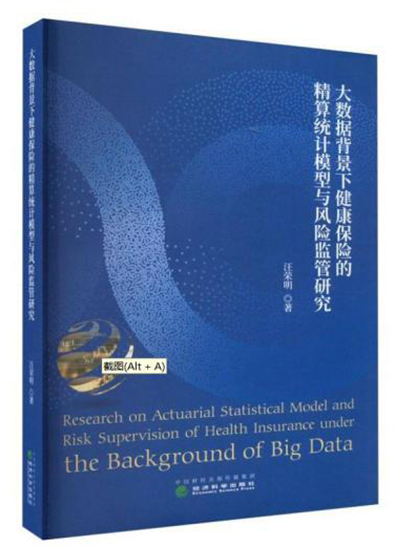A big data integration of health insurance

Research on Actuarial Statistical Model and Risk Supervision of Health Insurance under the Background of Big Data
The report to the 20th CPC National Congress advocates for promoting the orderly linking up of medical insurance programs at different levels and vigorously developing commercial medical insurance. Research on Actuarial Statistical Model and Risk Supervision of Health Insurance under the Background of Big Data, by Wang Rongming, president and professor at Shanghai University of International Business and Economics, explores the innovation of actuarial statistical models of health insurance and reform of risk regulation in combination with big data. Specifically, it examines the method of integrating big data in health insurance, simulates actuarial pricing for health insurance, and investigates the standardization of big data application in health insurance and privacy protection.
Health insurance represents a major research topic in the field of insurance and actuarial studies. Its complexity stems from the need for robust mathematical acumen and a compassionate, humanistic approach to care. Wang conducts a comprehensive and systematic collection and analysis of health insurance big data by tracking the research progress in the field over the past decade, using public databases, as well as visiting third-party institutions for the latest data and supplemental data from field investigations.
In the era of big data, the operation of health insurance yields a wealth of data from policyholders, medical institutions, insurance claims, and third-party institutions. The process of cleaning and screening this data for integrated application poses a challenge for the optimization of health insurance. The author tracks and innovates with the big data integration method for health insurance, by concentrating on multi-source heterogeneous health insurance data integration and multi-source fragmented data integration, offering a mathematical attempt to apply big data in health insurance.
China’s 14th five-year plan on national health explicitly emphasizes the necessity to increase the availability of commercial health insurance. Nowadays, traditional commercial health insurance has struggled to meet the demands for health management in the new era, prompting the accelerated development of new health insurance. However, the industry faces challenges related to data, including actuarial pricing on product development, and escalating incidences of insurance fraud year by year on the claims side. Correspondingly, the author attempts to theoretically innovate the actuarial statistical method of health insurance with big data and simulate pricing, while conducting empirical research on anti-fraud and risk early warning systems for health insurance.
Pei Changhong is a research fellow from the Institute of Economics at the Chinese Academy of Social Sciences.
Edited by YANG LANLAN
